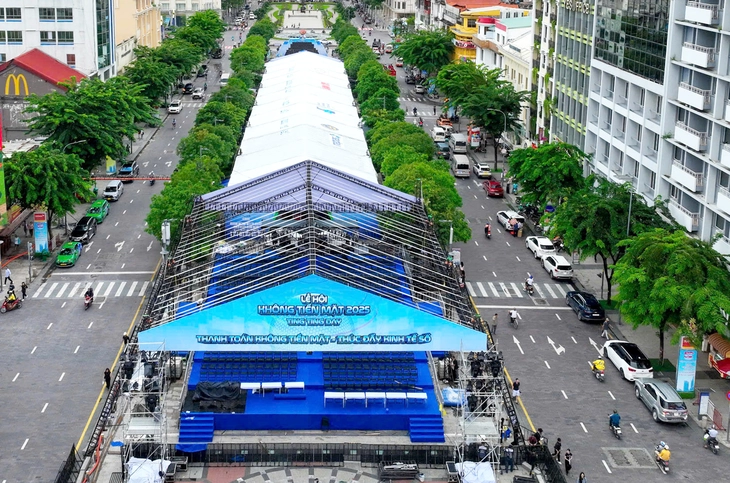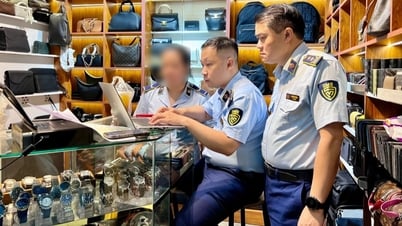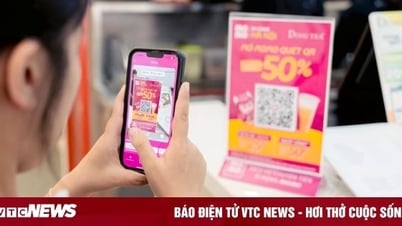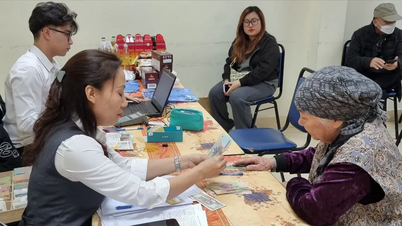
Many young people are excited and looking forward to experiencing the "Ting ting day" festival in the heart of Ho Chi Minh City - Photo: QUANG DINH
Faced with the above situation, recently the State Bank and banks have synchronously deployed many solutions to limit and prevent crime.
Many new scams clean out victims' accounts
After banks tightened security by requiring biometric authentication for transfers of VND10 million/transaction or VND20 million/day, cybercriminals have transformed many scams to continue to profit.
Recently, CT (born in 2007, Ho Chi Minh City) was contacted by a group pretending to be police officers by phone, falsely accusing him of being involved in a drug case, and asking him to "keep it a secret to cooperate with the investigation". This group instructed T. to leave home, rent a hotel room, and cut off contact with relatives.
At the same time, they called the child's father, threatening that his child was being kidnapped and demanding that 200 million VND be transferred immediately to T.'s account to "redeem the child". Fortunately, Ho Chi Minh City Police promptly intervened and rescued the victim.
In another case, Ms. N. - a business director in Ho Chi Minh City - was scammed out of more than 1 billion VND just because of a call from a "shipper" asking for a transfer. Then came a series of sophisticated enticements: asking to cancel the transaction, sending fake links, video calls for technical support, instructions for refunds...
Step by step, Ms. N. was convinced that the money was only "held for a few seconds" and would be refunded immediately, but eventually her account was emptied.
It has been noted that although biometric authentication regulations have tightened the practice of fraudulent money transfers, many victims are still psychologically manipulated to the point of voluntarily performing authentication operations to transfer money. Some cases have even borrowed money from friends and relatives to transfer billions of dong at the request of criminals, leading to total loss and even having to sell their houses to pay off debts.
Cashless payments boom, cybercrime also increases
According to the State Bank, cashless payments are becoming increasingly popular in Vietnam, especially in large cities such as Hanoi, Ho Chi Minh City, Da Nang... People are used to using bank accounts and e-wallets such as MoMo, ZaloPay, ShopeePay, VNPay ... to pay for everything from supermarkets, restaurants to household bills.
However, along with the strong development of electronic payments is the increasing trend of cybercrime with increasingly sophisticated tricks. The subjects often impersonate police officers, court officials, tax officers... to manipulate psychology and trick victims into voluntarily transferring money...
In particular, the subjects established "ghost" enterprises and opened payment accounts to serve illegal activities. Criminals also used payment accounts of newly established enterprises with names similar to reputable brands to receive and transfer fraudulent money...
In response to this situation, the banking industry has implemented many preventive measures. After 11 months of implementing biometric authentication through national population data, more than 113 million personal accounts have been biometrically verified. This helps prevent fraud on personal accounts, causing criminals to shift to exploiting corporate accounts.
Banks and wallets build "fences" to protect accounts
Speaking with Tuoi Tre , representatives of several banks and e-wallets said they are constantly proactively applying many advanced technologies and deploying multiple layers of protection to ensure safety for users and partners in all situations.
Specifically, MoMo representatives said that their technology complies with regulations on electronic identification (eKYC) to help prevent the creation of fake accounts and enhance system security from the root.
At the same time, it meets more than 300 strict criteria on encryption, access control, network security and real-time transaction monitoring to achieve PCI DSS version 4.0 security certification - the highest global standard for organizations processing payment data.
"We also apply modern security solutions on cloud computing platforms and multi-layered authentication to enhance defense capabilities against increasingly sophisticated attack risks," said a MoMo representative.
Cake by VPBank recently announced that it is the first digital bank in Southeast Asia to own a facial biometric solution that meets iBeta's ISO/IEC 30107-3 Level 2 standard. This is also the highest level that iBeta has certified for this category.
According to the evaluation results of iBeta, the bank's Cake Face Authen biometric identification and anti-fake facial solution is capable of detecting more sophisticated fraud in the form of 3D images such as silicon masks, screen-printed masks, faces recreated by specialized scanners... with absolute safety indicators (0% successful attack rate) and absolute experience (0% rejection of normal users), ensuring accuracy throughout the electronic customer identification process (eKYC).
Previously, this bank also equipped a feature to enhance deposit security with a passcode to help customers have more solutions to proactively protect their deposits.
Cake representative said that this is a technological solution that allows customers to proactively protect their deposits, by building additional security features for deposits using a code provided by Cake. This feature helps customers proactively control and limit unauthorized access to take control of devices, steal information...
According to the State Bank, this agency is continuing to tighten management of organizational accounts, requiring biometric authentication of legal representatives when opening accounts, adding transactions requiring biometric authentication; collecting lists of accounts suspected of fraud from banks.
This is the next step to clean up the payment account system, increasing protection for users in the digital environment.

Nguyen Hue walking street is ready for the "Cashless Day" party 2025 - Photo: VAN TRUNG
Promote technology application, tighten security
Digital bank Cake by VPBank has just launched the "AI Fast Money Transfer" feature, allowing users to simply paste an image or message containing account information to transfer money, instead of manually entering it.
Regarding protection solutions for customers when making non-cash payments, Ms. Nguyen Phuong Huyen - Director of Sacombank's personal customer segment - said that the bank is committed to protecting customers in the digital payment environment through biometric authentication, digital signatures, along with upgrading technology infrastructure, data encryption and anti-fraud communications.
The bank also deploys a series of modern technologies such as eKYC, Tap to Phone, and contactless payments to enhance experience and reduce risks.
Since 2020, HDBank has also established a digital transformation center (DTC), invested heavily in payment platforms and technology, aiming to become a "Happy Digital Bank" in the digitalization strategy for the period 2021-2025.
Banks handle fake accounts, block fraud
The number of fraud cases and the number of fraudulent receiving accounts have decreased sharply after cleaning up individual customers' payment account information.
That is the information Mr. Le Hoang Chinh Quang - Acting Director of the Information Technology Department of the State Bank of Vietnam (SBV) - shared with Tuoi Tre on June 13.
Number of customer fraud cases decreased by 57%
Mr. Quang said:
- To date, more than 116 million individual customer profiles have had their biometric information matched with the national population database. In other words, these are clean, genuine accounts.
Since July 1, 2024, the average number of cases of customers being scammed and losing money per month has decreased by 57% compared to the average of the first 6 months of 2024, when the regulation on cleaning account information for individual customers had not been applied.
At the same time, the average number of accounts receiving fraudulent money each month since mid-2024 has also decreased by 46.5% compared to the average of the first 6 months of 2024. Notably, at some credit institutions, there have been no recent cases of cybercrime fraud.
* What do the above numbers say, sir?
- The above figures show the effectiveness of applying biometric authentication to online transactions over 10 million VND and the total transaction amount is 20 million VND/day. The number of cases of fraud, appropriation of money from individual customers and the number of individual customer accounts receiving fraudulent money have decreased significantly.
* With the cleaning of personal customer account information, cybercriminals are turning to fraud using corporate accounts. What solutions will the State Bank have to prevent this situation?
- Currently, regulations do not require corporate customers to authenticate their biometrics when transacting online. Therefore, criminals can set up fake businesses to open bank accounts and commit fraud.
When drafting Decision 2345 at the end of 2023, the State Bank anticipated this risk, but at that time fraud mainly occurred with personal accounts. At the same time, the State Bank also considered that in order not to affect the normal operations of businesses, it should prioritize the implementation of biometrics with individual customers first.
In order to prevent the use of corporate accounts for fraud, the State Bank of Vietnam has issued circulars guiding Decree 52/2024 on non-cash payments. Accordingly, from July 1, corporate accounts wishing to conduct online transactions must authenticate the identity documents and biometrics of the legal representative.
To date, more than 711,300 business accounts have implemented biometric authentication, helping to prevent ghost accounts from being used for criminal activities.
Building a "digital shield" to protect people's accounts
* Along with the implemented policies, what technological solutions does the banking industry have to protect money in people's accounts?
- In addition to constantly warning people about fraud, the banking industry has deployed many technological solutions to protect customer accounts.
One is to clean up customer data, eliminating more than 132.5 million unauthorized accounts, which are the channels for criminals to receive money.
Second, the regulation prohibits credit institutions and payment intermediaries from sending SMS or emails containing links unless customers actively request them. This helps people easily identify and avoid clicking on fake links that lead to loss of money.
Third, deploy a system to monitor accounts and e-wallets suspected of fraud. When users transfer money to accounts on the warning list, the system will send a notification for customers to consider, and the bank can even suspend the transaction if it detects high risk.
These layers of protection are expected to significantly reduce cyber fraud.
* What recommendations do you have for people when using electronic banking services?
- To avoid being scammed, people need to keep personal information such as date of birth, citizen identification number, phone number, bank account... especially password, OTP code, credit card number absolutely confidential, do not share with anyone.
Be wary of calls claiming to be from a bank asking for information. This is a scam because banks never ask for confidential information over the phone, text messages or emails.
Users should also limit the installation of applications from unknown sources to avoid the risk of malware taking control of the phone and stealing money from the account. In my opinion, unverified applications should not be installed on phones or computers.
When receiving a call claiming to be from a competent authority with threatening content related to an investigation, people need to stay calm, not transfer money as requested and immediately report to the bank or police because this could be a sign of fraud.
In case of being scammed and losing money, people need to immediately contact the bank or police agency for support to minimize damage.
* Thank you sir.
Businesses may require biometric authentication when transferring money online
In the fourth quarter of this year, the State Bank will amend and supplement Circular 50 of 2024, which is expected to add regulations on biometric authentication for online transactions of some groups of businesses at high risk of being exploited for fraud, not to apply widely.
The identification of specific subjects and transaction limits will be carefully studied to ensure harmony between preventing high-tech crimes and facilitating businesses to operate in accordance with regulations. Large, transparent businesses are not included in the group being tightened.
Mr. Le Hoang Chinh Quang

Source: https://tuoitre.vn/bao-ve-tai-khoan-khach-hang-trong-thoi-dai-kinh-te-so-20250613231307235.htm































































































Comment (0)